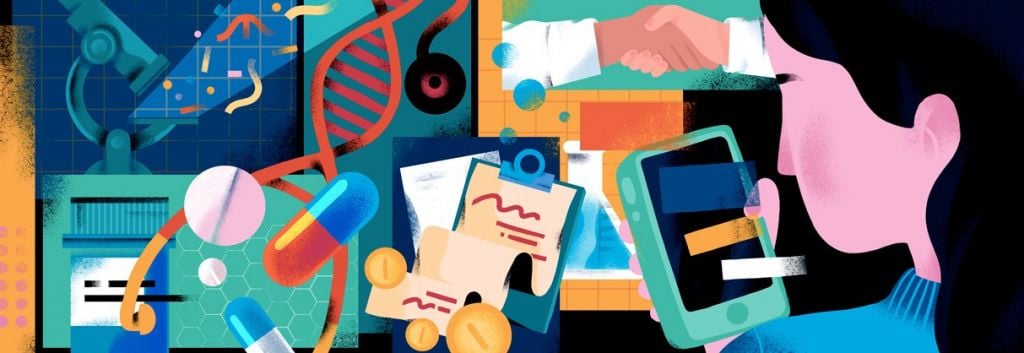Last week’s €1.75B deal between the German biotech Affimed and Swiss giant Roivant backs up an emerging trend of harnessing our innate immune system to treat cancer.
According to the deal’s terms, Affimed will receive €51M upfront to license to Roivant a preclinical-stage antibody drug for several undisclosed types of cancer. Roivant will handle the program once Affimed completes preclinical development. Additionally, Roivant has the option to co-develop other candidates with Affimed, which could form the basis of a Roivant spinout going forward.
This collaboration follows a massive €4.4B deal that Affimed signed with Genentech in 2018 to co-develop cancer therapies.
Affimed specializes in developing a type of antibody drug that can latch onto more than one target at the same time, called multi-specific antibodies. The firm’s drugs bind simultaneously to tumor cells and cells of the innate immune system — our first line of defence against infections and cancer — to trigger the cancer cells’ destruction. The most advanced drug candidate based on this technology is in phase II development for the treatment of various types of blood cancer.
A few decades ago, the field of immuno-oncology was practically seen as science fiction, but is now a mainstream sector in the biotech industry. Many approved immuno-oncology treatments such as CAR T-cell immunotherapies focus on boosting T cells, which are a key component of the adaptive immune system — the one that can ‘remember’ previous foreign invaders. However, approved immunotherapies don’t always work and have a number of limitations such as a risk of causing uncontrolled inflammation.
“In part because immunotherapy approaches employing T cells initially appeared very promising, the innate immune system has remained largely untapped as a therapeutic approach in oncology – until now,” said Adi Hoess, CEO of Affimed.
Cells in the innate immune system don’t just destroy cancer cells, but also activate the adaptive immune system. Therefore, boosting innate immune cells could enlist the entire immune system and work where approved therapies cannot. In the case of Affimed’s bispecific antibodies, they only activate immune cells already located next to tumor cells, which could reduce the risk of causing uncontrolled inflammation throughout the body like some immunotherapies do.
While the innate immune system has seldom been explored in immuno-oncology for a long time, this seems to be changing.
“A compelling body of clinical data has grown in recent years, demonstrating the power of the innate immune system in oncology,” said Hoess. “Partnerships like these are also a critical recognition of the promise the innate immune system holds in our understanding of developing a curative approach.”
The Roivant deal is just one of many this year happening in the immuno-oncology space for companies working with the innate immune system. For example, Kiadis Pharma, a Dutch company developing cell therapies based on natural killer cells, was recently purchased by Sanofi for a neat €308M.
“It’s true that there is a recent uptick in interest in discovering the full power of the innate immune system, as evidenced by recent partnerships between biotechs and pharma companies in the US and Europe,” noted Hoess.
Another factor pushing this field forward is that European biotech has seen a record-breaking year in terms of capital raised. One of the reasons is that the Covid-19 pandemic has generated enormous publicity for the pharma industry.
“The global pandemic has re-invigorated appreciation for the benefits that a strong and innovative biopharmaceutical industry brings, creating a halo effect for us at Affimed,” confirmed Hoess.
Image from Elena Resko





